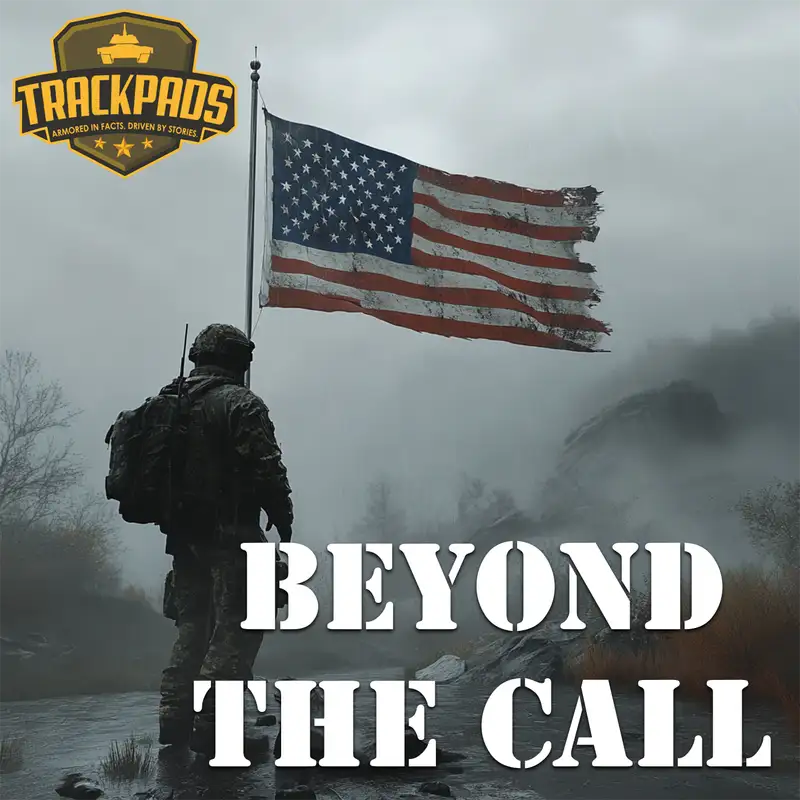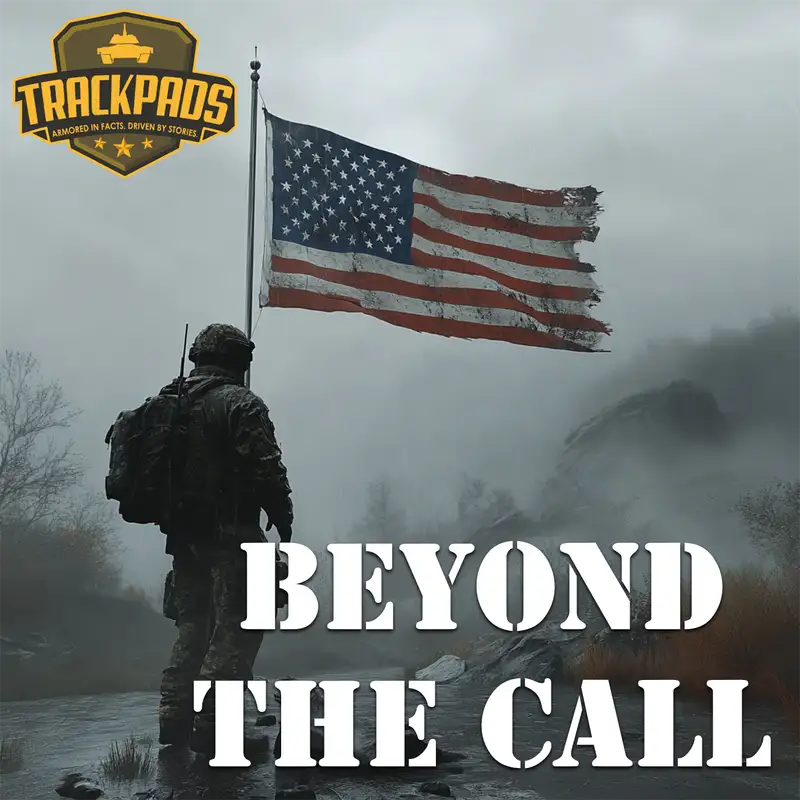Faith Under Fire: The Heroism of Chaplain Charles J. Watters
Welcome to Beyond the Call, where history, leadership, and heroism come alive.
Today’s episode explores the story of Chaplain Charles Joseph Watters, a powerful story of courage and perseverance.
If you enjoy learning more about military history and extraordinary individuals, be sure to visit Trackpads dot com for articles, podcasts, and more.
Introduction
Major Charles Joseph Watters exemplified extraordinary bravery and selfless devotion during the intense fighting of the Vietnam War, ultimately earning the Medal of Honor for his actions on November nineteenth, nineteen sixty-seven.
Serving as a chaplain with the United States Army's Company A, One Hundred Seventy-Third Support Battalion, One Hundred Seventy-Third Airborne Brigade, Watters continually exposed himself to enemy fire at Hill Eight Seventy near Dak To in the Kontum Province of Vietnam, to provide aid, comfort, and medical assistance to wounded soldiers.
His courage and dedication were instrumental in saving numerous lives, even at the cost of his own.
Amidst relentless combat, a defining moment of Chaplain Watters' heroism occurred when he raced through heavy fire to carry wounded paratroopers to safety.
Unarmed and completely exposed, his relentless commitment inspired all who witnessed his fearless compassion.
His bravery was later encapsulated by those who survived the harrowing battle, describing him as the embodiment of unwavering faith and extraordinary valor in the chaos of war.
Historical Context
The Battle of Dak To, fought in November nineteen sixty-seven, was one of the fiercest and bloodiest encounters of the Vietnam War.
Situated in the rugged terrain of the Central Highlands of Vietnam, the battle unfolded as American and South Vietnamese forces engaged in brutal combat against North Vietnamese regulars.
The struggle for control of Hill Eight Seventy became a symbolic and strategic focal point, with fierce fighting underscoring the high stakes and immense costs of the war.
Both sides understood the significance of the location, as controlling it would influence the broader tactical situation throughout the region.
Geopolitically, the Vietnam War represented a critical flashpoint in the global Cold War struggle between the United States and the Soviet Union, with Vietnam becoming a proxy battleground.
As the United States sought to halt the spread of communism in Southeast Asia, North Vietnam, supported by the Soviet Union and China, was equally determined to unify the country under communist rule.
Battles like Dak To illustrated the intensity of these broader geopolitical tensions, demonstrating the extent to which both sides would commit resources and manpower to achieve their objectives.
Hill Eight Seventy became symbolic of the fierce resolve of both American and North Vietnamese forces.
Key players in the conflict included General William Westmoreland, who commanded United States forces in Vietnam and directed the American strategy of attrition, aiming to weaken enemy capabilities through sustained combat.
Opposing him was North Vietnamese General Vo Nguyen Giap, a renowned military strategist who skillfully managed North Vietnamese resources and tactics against superior United States firepower.
The battle brought together these military leaders' contrasting strategies, showcasing the tactical discipline and tenacity of both armies.
The ferocity of the fighting at Dak To epitomized their willingness to endure severe losses for strategic gains.
Chaplain Watters' unit, the One Hundred Seventy-Third Airborne Brigade, known as “Sky Soldiers,” played a pivotal role throughout the Vietnam conflict, recognized for their airborne operations, rapid deployment capabilities, and distinguished combat performance.
This elite unit was tasked with securing key positions and countering enemy movements in strategically critical regions.
During the Battle of Dak To, the One Hundred Seventy-Third confronted formidable enemy defenses, facing entrenched positions, complex tunnel networks, and intense artillery fire.
Their operations at Hill Eight Seventy exemplified the extraordinary resilience and bravery required of paratroopers under relentless combat conditions.
The actions of Major Charles Watters and his fellow soldiers on Hill Eight Seventy vividly highlighted the grueling nature of infantry combat in Vietnam.
The difficult mountainous terrain, compounded by monsoon rains and dense jungle, severely limited visibility and maneuverability, intensifying the already severe conditions.
Soldiers faced not only physical exhaustion and enemy fire but also logistical challenges, making the task of rescuing the wounded even more heroic and perilous.
Chaplain Watters' courage under such adverse conditions underscored the profound sacrifices and selfless dedication that characterized the United States military's engagement in Vietnam.
Personal Background
Charles Joseph Watters was born on January seventeenth, nineteen twenty-seven, in Jersey City, New Jersey, a community where faith and duty played integral roles in shaping his character.
Early in life, Watters attended Seton Hall Preparatory School before continuing his education at Seton Hall University.
Deeply influenced by his Roman Catholic upbringing and a strong sense of civic duty, Watters chose to dedicate his life to serving others, culminating in his ordination as a priest in nineteen fifty-three.
He served various parishes in New Jersey, fostering a legacy of compassion and spiritual guidance among his congregations.
Watters' calling to serve extended beyond civilian life, leading him to join the New Jersey Air National Guard in nineteen sixty-two as a chaplain.
Driven by a profound sense of duty, in nineteen sixty-four he transitioned into active duty with the United States Army, beginning his first deployment to Vietnam in July nineteen sixty-six.
Known among fellow soldiers for his unwavering courage and comforting presence, Watters repeatedly volunteered to stay beyond his required tour, determined to support and protect the men around him.
Tragically, his commitment would ultimately cost him his life, but the legacy of bravery and devotion he left behind continues to inspire generations.
Medal of Honor Citation
Chaplain, Major, Charles Joseph Watters, United States Army, Company A, One Hundred Seventy-Third Support Battalion, One Hundred Seventy-Third Airborne Brigade.
Date of Action: November nineteenth, nineteen sixty-seven.
For conspicuous gallantry and intrepidity at the risk of his life above and beyond the call of duty.
Chaplain Watters distinguished himself during an assault on Hill Eight Seventy near Dak To, Kontum Province, Republic of Vietnam.
Chaplain Watters was moving with one of the companies when it engaged a heavily fortified enemy battalion.
As the battle raged and casualties mounted, Chaplain Watters, with complete disregard for his safety, rushed forward to aid the wounded, giving words of encouragement and administering last rites to the dying.
His actions were repeated time and again under heavy enemy fire.
Chaplain Watters moved from front to rear repeatedly, carrying wounded soldiers to safety, despite the constant barrage of mortar, artillery, and automatic weapons fire.
Unarmed and fully exposed to enemy fire, he retrieved wounded men from exposed positions and dragged them to cover.
When an American paratrooper was hit and fell outside the perimeter, Chaplain Watters, without hesitation and heedless of intense enemy fire, dashed forward and carried him to safety.
Later, while attending to wounded soldiers in a hastily organized aid station, he was mortally wounded by an enemy mortar shell.
Chaplain Watters' extraordinary heroism, profound faith, and inspiring devotion to duty were directly responsible for saving many lives and reflect great credit upon himself, his unit, and the United States Army.
The Battle and Medal of Honor Actions
On November nineteenth, nineteen sixty-seven, the fierce battle for Hill Eight Seventy began as American troops, including Major Charles Watters and his comrades from the One Hundred Seventy-Third Airborne Brigade, faced relentless resistance from heavily entrenched North Vietnamese forces.
The enemy battalion had established formidable defensive positions, fortified with bunkers, tunnel networks, and extensive use of artillery and automatic weapons.
Under intense and continuous enemy fire, American paratroopers advanced, determined to dislodge the adversary.
It quickly became apparent that the mission would require extraordinary bravery and resilience.
Throughout the chaotic and brutal combat, Chaplain Watters remained at the forefront, repeatedly risking his life to minister to the wounded.
Without any weaponry or personal protection, he moved openly across the battlefield, fully exposed to enemy fire.
His courage became a beacon of hope for the soldiers around him, as he tirelessly provided spiritual support, medical aid, and reassurance amidst the carnage.
Each act of compassion reinforced morale, urging the men to persevere through the devastating firefight.
Time and again, Chaplain Watters exhibited extraordinary courage, repeatedly venturing into open areas swept by enemy artillery and automatic fire to retrieve wounded paratroopers.
On numerous occasions, he personally carried injured soldiers to safer positions, defying the barrage of enemy bullets and explosions.
His presence was constant and unwavering, as he offered prayers, administered last rites to the dying, and provided comfort and reassurance to the wounded.
His tireless dedication directly saved numerous lives that day.
One particularly dramatic moment underscored his heroism vividly.
Amidst fierce fighting, an American paratrooper was struck by enemy fire and fell wounded outside the relative safety of the defensive perimeter.
Without any hesitation or regard for his personal safety, Chaplain Watters dashed forward through heavy gunfire, retrieved the fallen soldier, and carried him back to cover.
This selfless act resonated profoundly with those around him, exemplifying a courage born of unwavering devotion and compassion.
As casualties continued to mount, Chaplain Watters refused to retreat or seek shelter.
Instead, he focused his efforts on establishing and organizing a makeshift aid station near the front lines.
Despite constant artillery and mortar bombardments, he remained steadfast, caring for the wounded and providing guidance to overwhelmed medical personnel.
His calm presence amidst chaos helped sustain those around him, bolstering morale and reinforcing their resolve.
Tragically, Chaplain Watters' relentless heroism was cut short when an enemy mortar round exploded near the aid station.
Severely wounded, he succumbed to his injuries, sacrificing his life in selfless devotion to his fellow soldiers.
His extraordinary actions profoundly impacted the outcome of the battle, inspiring continued courage among the men he so selflessly aided.
The memory of his bravery and compassion became a lasting legacy, vividly embodying the highest traditions of military honor and personal sacrifice.
Reflections and Lessons Learned
Chaplain Charles Watters’ extraordinary bravery and sacrifice provide profound lessons in leadership, selflessness, and moral courage.
His actions at Hill Eight Seventy highlight the critical importance of placing the well-being of others above personal safety, demonstrating an unwavering commitment to duty and compassion.
Modern leaders, both military and civilian, can draw inspiration from Watters' example, understanding that true leadership involves serving others fearlessly, especially during moments of crisis and adversity.
Watters’ heroism underscores the powerful role of spiritual and moral support on the battlefield, revealing how a single individual's steadfast presence can significantly bolster morale and resilience in dire circumstances.
His actions illustrate how spiritual leadership can transcend traditional military roles, reinforcing soldiers' courage and sustaining their hope under severe duress.
Today, this lesson remains relevant as leaders recognize the importance of emotional and psychological support alongside strategic and tactical readiness.
Furthermore, Chaplain Watters’ sacrifice highlights the timeless value of ethical bravery and integrity, reminding us of the necessity to act courageously and selflessly when confronted by difficult choices.
His story challenges individuals to reflect on their own values and principles, emphasizing that heroism can manifest through compassionate actions and ethical decision-making.
Watters’ legacy thus serves not only as a historical testament but also as an enduring call for each person to aspire toward greater moral strength and service to others.
Closing
Chaplain Charles Joseph Watters embodied the highest ideals of courage, compassion, and self-sacrifice, leaving behind a legacy that continues to inspire generations.
His actions during the fierce battle for Hill Eight Seventy offer timeless lessons in leadership, faith, and unwavering commitment to others.
Join us next time as we uncover another extraordinary Medal of Honor story that goes Beyond the Call.
Don’t forget to subscribe and share these powerful stories of heroism and honor.
Thank you for joining me on today’s episode of Beyond the Call.
If you would like to dive deeper into more stories of bravery, leadership, and history, visit Trackpads dot com.
Until next time, keep exploring, stay inspired, and remember—the lessons of the past shape the warriors of the future.

